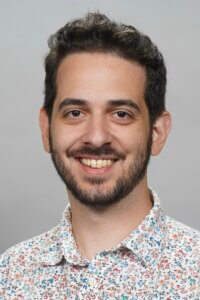The Journey of Actuarial Transformation
Insights from Ariel Weis, FSA, FCIA, on balancing personal passions and emerging trends
December 2024
The U.S. Bureau of Labor Statistics projects that the actuarial profession will grow by 22% between 2023 and 2033. This influx of actuaries will not just apply their mathematical and statistical expertise to assess the financial impact of risk and uncertainty. As they move through the coming stages of actuarial transformation, many also will have the opportunity to work with employers that support their professional passions and encourage the exploration of emerging trends, such as leveraging AI.
Recently, I connected with Ariel Weis, FSA, FCIA, to discuss how his personal interests align with his actuarial career. Along the way, I gained insights on emerging trends within his area of expertise.
Can you share a bit about your personal passions and how they intersect with your career as an actuary?
Over the years, many hobbies and pastimes have held my interest, some for a short time and some for longer (and in some cases, permanently). I’m currently interested in cooking, which I enjoy on an almost daily basis, preparing meals for myself and my family using different cookbooks and websites or out of thin air. I also enjoy learning about and playing chess; I regularly fail to make time to exercise, even though I derive great satisfaction from it when I do partake; I regularly engage in mindful meditation; and I’ve spent a ridiculous amount of time over the last several years listening to podcasts and reading books on social psychology and organizational psychology. I’ve also spent the last year or so playing around with ChatGPT and derivative large language models (LLMs) as a personal pastime, for the most part, but also for some aspects of work.
I would say that I bring the same mentality and disposition to these personal activities and my career as an actuary. Whether I’m cooking, preparing for a presentation or meeting at work, or getting ready to go for a run, each of these pursuits requires me to stay organized if I want the best possible outcome. I’ve developed strong habits of planning ahead, focusing on the moment and reflecting on what I could have done better, which, I think, enrich my development as an actuary and have had a positive impact on my career.
More specifically, though, the social and organizational psychology knowledge I’ve picked up from listening to podcasts and reading books has come in handy, helping me grow as a person and as a professional. I like to believe that I’ve become much more humble over time in terms of acknowledging that even when I don’t know about or feel I haven’t succumbed to cognitive biases (systematic errors in thinking that affect how we perceive others and make decisions, often leading to irrational judgments), that they are probably still there, and I try to use that knowledge to challenge myself to stay curious and do better at anything I attempt to tackle.
Then there is the use of artificial intelligence (AI). Leveraging AI, across the board, has the potential to enrich my professional life by:
- Summarizing long emails
- Highlighting key aspects of communications that I should be more mindful of
- Helping me draft first passes of documents
- Providing templates to use to save time
- Helping me manage a busy schedule
How has your personality influenced the way you interact with your colleagues and your actuarial work?
I think if you were to ask different people what my personality is, you would likely get different answers depending on who you ask. And I don’t think this is particularly unique to me—we all take on different masks and roles at various points throughout the day as we go through our lives.
However, I see myself these days as more of a “big picture” thinker than a “deeply in the weeds” kind of actuary, and I think this naturally finds its way into all the interactions I have at work and how I approach any task. I’m constantly trying to reframe and bring the team back to “What is our ultimate goal with what we’re doing here?” and “How does this fit within everything else that we have going and that other teams are trying to do?”
That doesn’t mean that I’ve stopped being an “in the details” kind of guy—you can take the actuary out of the models, but you can’t … well, the analogy doesn’t quite work, but I think the idea is clear. However, I’ve come to embrace the ideas that “all models are wrong but some are useful” (from British statistician George Box) and “good enough is good enough,” and contextualize most of my work within those paradigms these days. I’d like to think that this means that my colleagues find my contributions valuable, and that’s probably true sometimes. But other times, they probably find I am trying to move at a different pace than they are, which I could see would be frustrating to some.
However, that’s where I like to believe other parts of my personality kick in. I tell myself that I’m a fairly congenial person to work with, and I have a broad sense of humor, so even when we’re butting heads (I am predisposed to be directly confrontational and address conflict head on), I like to think everyone knows we are arguing about the thing we are working on and not attacking each other.
Ultimately, I have a lot of trust and respect for the people I work with and try to show that daily by respecting their opinions, inputs and work products. I tend to try to build on what others have done or provide the foundations to build on and accept that just because someone did something differently, it doesn’t mean it’s worse than how I would have gone about it.
As a life actuary, can you share what you foresee as an emerging trend in your area of work?
The most obvious and truthful answer that I can give to “what is an emerging trend?” is leveraging AI in its current form. Machine learning and other predictive analytics algorithms and techniques have been around for quite a while, but what some companies have achieved with the LLMs currently available is fantastic. There is a whole realm of being able to put together good code more readily to achieve tasks and the documentation to go along with it that’s going to save many of us a lot of time.
At the same time, I’m looking forward to the same technology being implemented to help us derive valuable insights from data, be it in the form of putting together interesting dashboards, surfacing nuanced trends that would take a while to pick up on or highlighting outliers in data blocks that are too large to manually comb through.
What excites me most about this is when we’ll get to a place where we’re able to organize our data more consistently as an industry and start pushing the limits of what the predictive capabilities of these models can do—to investigate different scenarios more quickly, understand stressors and in general inform our decision-making at a more rapid pace. I think we’re a ways away from being able to do any of that, but it will allow us to come up for air from doing detailed model work and scrubbing data for cleanliness, and instead put us in a position to spend time thinking about what insights we can provide others and offer better products to the public.
In what way do you see emerging trends and other hot topics leading to actuarial transformation?
My current role at the company where I work is in actuarial transformation. I think of the AI trend as organically pushing something that the industry has been doing for well over a decade: getting on top of technological debt, organizing our data for the 21st century, empowering actuaries to transition from data pushers to information interpreters and generally requiring us to understand actuarial concepts more intrinsically.
I believe that there’s been an interesting transition over time for the profession. Initially, we were the people who could effectively and efficiently calculate premiums and reserves by hand. Then, we embraced the computing power of computers, transforming us into modeling experts. This actuarial transformation came somewhat at the cost of losing our grounding in simplified models to understand and project reality.
Over time, we matured in terms of modeling and became data people, pushing bits and bytes around in spreadsheets, databases and now data lakes. We’ve returned to our fundamental knowledge, what separates us as a profession. This involves understanding the different drivers of risk and potential outcomes. We are trying to come up with ways to interpret what data about those drivers tells us. This effort will help us make better decisions for the future.
In this sense, I’m proud to be part of a profession that keeps evolving as technology allows us to move away from tasks and into the type of thinking that maybe one day generalized AI will be able to replicate but hasn’t yet.
Statements of fact and opinions expressed herein are those of the individual authors and are not necessarily those of the Society of Actuaries or the respective authors’ employers.
Copyright © 2024 by the Society of Actuaries, Chicago, Illinois.

